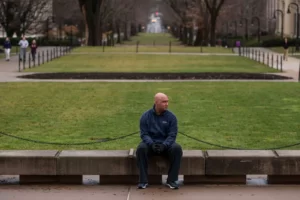The Palm Beach Post series, “Dying for Care” is a good example of investigative business journalism that changed prison operations in Florida. The Post documented soaring fatalities and brutally indifferent treatment after Florida privatized its health care system, and it exposed a billion-dollar corporation that hid data on its pattern of death and lethal care in Florida and other states. The investigation won the 2015 Bronze Award in the Barlett & Steele Investigative Journalism Awards.
Here’s how the Post did it, according to the story’s reporter, Pat Beall.
Florida doctors treating inmates reached out to Beall in April 2014. They told her that prisoners were dying horrific deaths but refused to provide any detail, citing HIPPA.
To try and substantiate their observations, Beall requested mortality figures from the Florida Department of Corrections under the state’s open-records law.
DOC turned over minimal data. Numbers indicated rising death rates, but did not provide enough detail to determine whether homicides and accidents were driving the increased numbers as opposed to illness and suicide. But Beall was seeking specific inmate mortality data.
After multiple information requests to the DOC, officials finally acknowledge they had the data she needed, but they would need to create a computer program to retrieve it, at an unknown cost to The Post.
Based on previous reporting on Florida’s prison system, Beall believed that DOC had huge databases of inmate mortality data. DOC ignored Beall’s multiple requests for more specific data, however. Pressed, they later provided a slice of irrelevant data. Pressed further, they denied comprehensive data existed.
Post attorneys requested data directly from the head of DOC. There was no response.
While pushing for numbers, Beall also went looking for inmate stories.
To determine possible patterns of maltreatment, Beall pulled and examined every federal prisoner civil rights suit brought by all Florida inmates between 2004 and 2014 against the two companies which held the state prison medical care contracts: Wexford Health Sources and Corizon Inc., as well as Corizon’s predecessors, Prison Health Services and Correctional Medical Services.
In addition to the more than 350 Florida suits, she also examined federal lawsuits in Kentucky, Maine, New York, New Mexico, Idaho, Minnesota, Massachusetts, Oregon and New Jersey.
But Beall faced challenges collecting these stories. Her correspondence to these inmates frequently disappeared or was returned. Inmates, their families and their lawyers who won suits were bound by gag orders. Many court monitoring reports were heavily redacted and names of inmates were withheld. In cases where suits had not been resolved, all but one family she contacted declined to speak, on or off the record, citing a fear of retribution.
However, some individuals risked either retribution or court sanctions in order to provide Beall with background information. Beall also found little-known audits, medical reports and court-ordered monitoring reviews. And in more than 2,000 pages of Florida contract bids and related documents, Beall discovered that Corizon had withheld key information on recent deaths and critical reports of inmate treatment in other states; information that would have likely cost them their $1 billion-plus Florida contract.
Finally, after months of back and forth with DOC, the agency quietly published 10 years of detailed inmate mortality data on its website. It did not tell The Post it had done so. Beall and Post data editor Kavya Sukumar took the data and used statistical analysis to determine whether deaths were in fact rising under the newly privatized health system.
Ultimately, Beall unearthed proof that within 100 days of privatization, inmate deaths from illness hit a 10-year high. The number of prisoners sent to outside hospitals plummeted. Two inmates with lethal cancers were ignored, then given Tylenol. One died. Cancer broke the back of a second inmate in more than a dozen places before he was treated. An inmate was left without a hip joint. Medicines were abruptly discontinued and surgeries delayed, with horrific consequences.
Beall documented a years-long pattern of maltreatment and inmate death by Corizon in other states, cities and counties. When tallied on a spreadsheet, court cases, audits in other states and reports documented not only a pattern of substandard care and death, but also some very specific patterns of maltreatment.
DOC first insisted the rising Florida death numbers were a fluke. Then, 48 hours before Beall’s stories were published in 2014, DOC issued a press release, announcing it would begin fining Corizon and demanding reforms from the firm. The president of Corizon, the nation’s largest inmate health care firm, flew to Tallahassee, and pledged staff from other states would be brought to Florida.
Early in 2015, Beall’s work was cited by legislative committees and a major white paper on state prison reform. In January 2015, the DOC secretary and the governor’s top-ranking prisons aide quit.
But abuse continued. In February 2015, Beall secured and published documents showing Corizon had failed to report information on inmate deaths, failed to stock even basic drugs, doled out powerful psychiatric drugs without doctors’ supervision and delayed expensive treatments for life-threatening conditions, including cancer, which could only be provided outside the prison walls.
Additionally, Beall told the story of a third inmate who died after her spreading, painful cancers were first ignored, then treated with ibuprofen.
Ten days after her story appeared, the state canceled the contracts, valued at more than $1.3 billion. They are now being rebid.
We’ll feature more winners of the 2015 Barlett & Steele Awards in coming weeks.










